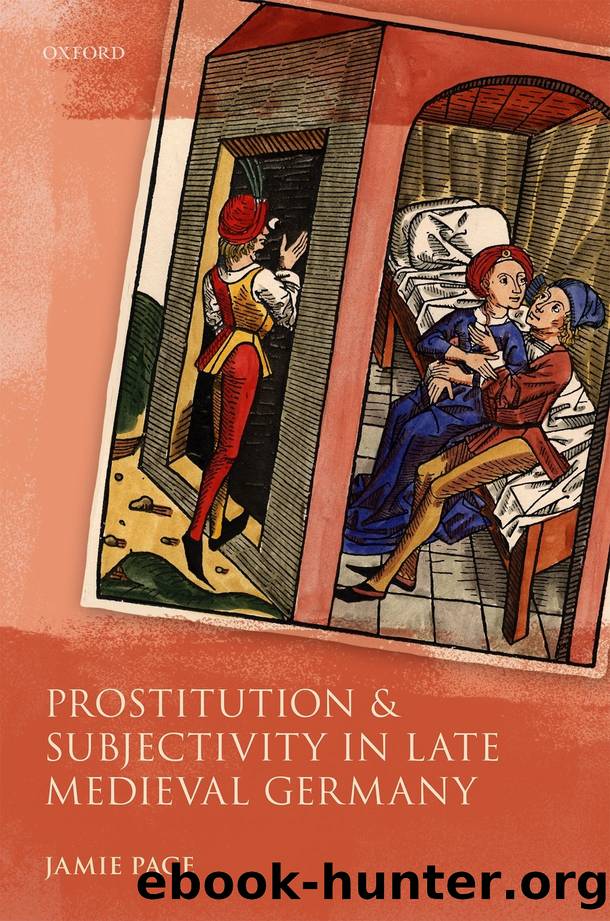Prostitution and Subjectivity in Late Medieval Germany by Jamie Page;

Author:Jamie Page; [Page, Jamie]
Language: eng
Format: epub
ISBN: 9780192607560
Publisher: OUP Premium
Published: 2021-02-10T00:00:00+00:00
âDear Margrette, I know well you wonât say anything about it, which is why I want to tell youâ
These dramatic scenes appear to have been followed by a period of relative quiet in the brothel. Both Anna and Margrette refer to the passing of a few weeks, while their statements also suggest that although the other women in the brothel knew Els had been ill, they did not yet know that she had been pregnant or had lost her child. As Els herself testified, evidently in response to a direct question, âthe child came from her, but she does not know if it was a boy or a girl, and nobody was with her but the brothel-keeper [Barbara]â (Do kam das Kind von ir, aber Sie wià nit ob es ein knab oder medlin und nyemant bey ir wer gewesn dan die frauenwirtin).72 Only one other person seems to have had any knowledge of this scene. This was Barbel von Esslingen, who in Elsâs own statement is described bringing water to Els after her miscarriage and seeing the babyâs body on a bench before witnessing Barbara dispose of it in a latrine. Els claimed that Barbel then âwent down to the women, and said to them âoh dear women, what a miserable thing I have seenââ, and when asked what this was, had replied âit is not the time for me to sayâ (Do wer dieselb Barbel wer hinab zu den frauen komen, und zu den gesprochen, O lieben frauen was herzen leydes han ich gesehen. Befragten die sie, was das were. Antwort sie, es ist nich zeit, das ichs sag).
This silence persisted for a short time, an indication perhaps of Barbaraâs initial success in preventing most of the women in the brothel from finding out exactly what had happened. At this stageâor so he later claimedâLienhart also appears to have been unaware of Elsâs pregnancy and Barbaraâs role in ending it. This was to change rapidly around the time of the Whitsun fair, however, when a set of converging factors contributed to knowledge of what had happened becoming public. The fair is mentioned in several of the womenâs statements and was a major annual event in the cityâs calendar, drawing in textile merchants from across southern Germany and Italy.73 This undoubtedly meant a busy time for the brothel, when a higher than usual number of visitors made it harder to contain the spread of talk and rumourâa set of circumstances the women within it were able to capitalize on.
The first step in this process saw knowledge of Elsâs child spread among the other women in the brothel. As Els herself testified, only she, Barbara, and Barbel von Esslingen knew initially that she had miscarried. This was to change when Els revealed what had happened in two private conversations reported by Margrette von Biberach and Anna von Ulm. Margretteâs statement suggests that Els was prompted to speak to her by a visit to the brothel by the councilâs men, Stählin and Bernhart.
Download
This site does not store any files on its server. We only index and link to content provided by other sites. Please contact the content providers to delete copyright contents if any and email us, we'll remove relevant links or contents immediately.
| Africa | Americas |
| Arctic & Antarctica | Asia |
| Australia & Oceania | Europe |
| Middle East | Russia |
| United States | World |
| Ancient Civilizations | Military |
| Historical Study & Educational Resources |
Magic and Divination in Early Islam by Emilie Savage-Smith;(1197)
Ambition and Desire: The Dangerous Life of Josephine Bonaparte by Kate Williams(1087)
Operation Vengeance: The Astonishing Aerial Ambush That Changed World War II by Dan Hampton(986)
What Really Happened: The Death of Hitler by Robert J. Hutchinson(871)
London in the Twentieth Century by Jerry White(848)
Time of the Magicians by Wolfram Eilenberger(844)
Twilight of the Gods by Ian W. Toll(813)
The Japanese by Christopher Harding(803)
Papillon by Henry Charrière(796)
Lenin: A Biography by Robert Service(780)
The Devil You Know by Charles M. Blow(779)
Twelve Caesars by Mary Beard(769)
Freemasons for Dummies by Hodapp Christopher;(749)
The Churchill Complex by Ian Buruma(732)
Napolean Hill Collection by Napoleon Hill(706)
The Enlightenment by Ritchie Robertson(693)
Henry III by David Carpenter;(690)
Bohemians, Bootleggers, Flappers, and Swells: The Best of Early Vanity Fair by Bohemians Bootleggers Flappers & Swells- The Best of Early Vanity Fair (epub)(688)
The Rise and Triumph of the Modern Self by Unknown(659)
